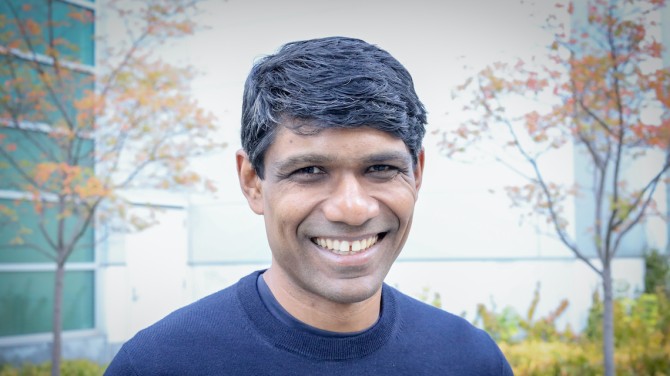News directly from Cornell's colleges and centers
Samaranayake named to Popular Science’s Brilliant 10
By Syl Kacapyr
Each year, Popular Science embarks on a nationwide search to find its ‘Brilliant 10,’ a roster of 10 early-career scientists and engineers developing ingenious approaches to solving the world’s grand challenges. This year’s Brilliant 10 includes Samitha Samaranayake, an assistant professor in Cornell’s School of Civil and Environmental Engineering who works on mathematical modeling and algorithm design for large-scale transportation systems.
Popular Science’s 2022 list of “the top up-and-coming minds in science” was published Oct. 19, and cites Samaranayake’s work to design algorithms to help varied modes of mass transit work more seamlessly together. Not only is Samaranayake working to improve transportation, according to Popular Science, his research aims to find “better ways to quantify how equitably transit resources are apportioned, so that city planners can ultimately design new systems that reach more people more efficiently.”
“It is an honor to be considered for this prestigious list,” said Samaranayake, who is also a graduate field faculty member in Systems Engineering, the Center of Applied Mathematics and the School of Operations Research and Information Engineering. “I am extremely excited that Popular Science has chosen to highlight research on innovations in mass transit, an area that is critical for improving the sustainability and equity of personal mobility, but is often overshadowed by car-centric technologies. I hope this recognition will help increase awareness on the importance of developing new, mass-transit-centric transportation solutions and inspire more people to work in this area.”
Earlier this year, Samaranayake received a National Science Foundation CAREER Award to research how multi-modal transit systems can help create a more sustainable and equitable transportation future. Such systems would integrate modern transportation technologies, such as agile, demand-responsive shuttle services, with the efficiencies of mass transit.
His research approach includes looking at problems through the lens of algorithm engineering, developing new algorithms and theoretical insights by understanding domain specific characteristics of transportation-related variants of classical optimization problems.
“The primary aim of my research is to create theoretically sound and practically meaningful solutions for improving how people move in cities,” said Samaranayake, who has a diverse academic background in computer science, economics, operations research and civil engineering. He has also worked for multiple technology companies such as Synopsys, Oracle and Google.
“Cornell’s unique collaborative environment through the graduate field system has allowed me to work with graduate students and researchers in multiple related fields. This recognition is largely due to the great collaborators that I have had the fortune to work with both at Cornell and beyond. I also want to acknowledge the support from the National Science Foundation and Department of Energy in promoting innovations in transit-centric mobility,” Samaranayake added.
Samaranayake is a founding principal investigator at Cornell’s Center for Transportation, Environment and Community Health, which is funded by the U.S. Department of Transportation to research and develop new transportation innovations to limit adverse impacts on public health and the environment.
Media Contact
Get Cornell news delivered right to your inbox.
Subscribe

